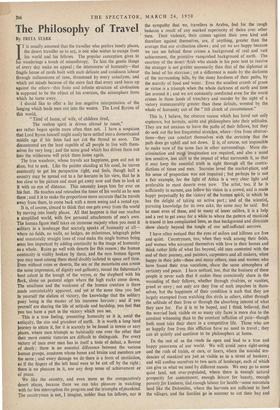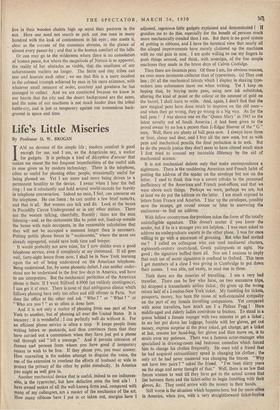proposition to put to the clerk, find yourself behind a
traveller with the most complicated needs. But this is nothing to the agonies of getting attention at an American air terminal. For the clerks .are always on the phone making reservations for people travelling to San Antonio via Moose Jaw, and have no time for simple persons like myself who merely want to pick up a ticket ordered, paid for and all set. I remember spending two or three hours that way in San Francisco. Fortunately, there is an excellent hostelry across the street, so with Coca Cola and the newspapers I passed the time, till one of the female hired helps was free enough to hand me an envelope containing my ticket, &c. Let us hope that all that is changed by now—and that I can remember where I put my ticket and my new passport. I have already found the old one, now alas of purely historical interest. The new one is doubtless in a safe place, if I only knew what safe place.
Deadalive
MY inward world is strangely still ; It seems the wintry fog without Into one's very wits may steal And shut light, joy and fancy out.
Not a mouse stirring ; not a glim Of that lost microcosm! Why, A child with his toy panoram Is better off than I Yes, and some dolt's mislaid the map! Life has forsaken this poor mind ; Ev'n Memory has shut up shop, And then pulled down the blind. . . .
Alas, through all Man's centuries No wizard yet has forged the key To unlock at will the cell where lies The mage of dream, called Fantasy!
Worse ; even with one's heart for bait, The soul may stagnant stay, and numb ; Love may stand weeping at the gate, And yet refuse a crumb.
WALTER DE LA MARE.
Comedians Old and New
By LIONEL HALE it H, the clowns that I have seen in my time ! " says Simon the Tanner in Middleton's The Mayor of Quinborough; and the words are full of affectionate reminiscence—that warm affection, that rosy memory which we reserve for the clowns, the drolls, the funny men. And now already in 1950 we have lost Harry Lauder, long retired, and Sid Field, who died (as it were) in his grease-paint. 'It is too much. I tremble each morning when I open the newspaper lest some other flame of laughter has been quenched.
The death of a comedian, more than the death of any other public figure, eclipses our gaiety. It is not only that we associate him in our memory with bright lights, and a warm audience, and a cigar after a good dinner. It Is because, while with a tragic actor the idea of death is never very far distant, death has nothing to do with the well-spring of life that bubbles up in the throat of a funny man. The death of a tragedian may be a fitting climax to his nightly deaths as Hamlet or Othello or Richard III. His death may be all right ; but the death of a comedian is all wrong. He is compact of life ; it seems as if the veins on his forehead may burst with it. A life of poverty, perhaps, or of drunkenness—thus clowns love to portray the world: a low life, but life greater than life-size. How is it possible that Harry Tate is no longer fishing, with mouth- filling objurgations all ready for that contemptuous explosion which shakes his wattles ? How is it possible that Will Hay is no longer enduring—with so tolerant an air of frustration!—the slings and paper arrows of his outrageous form ? As for the one and only Wilkie—thou wast not born for death, immortal Bard I beg leave, sub specie aeternitatis, to disbelieve them. 1 put no credit in the death of comedians ; their raddled faces, the rags and tatters of their clothes, their revolving eyes, are still as clear to memory as they ever were across the footlights. " Still are thy pleasant voices, thy nightingales, awake." Well, perhaps not quite nightingales. Corn-crakes, bull-frogs, gibbering bats. . . .
I do not know how far it is true that your comedian will fall short of the heights if he lacks a personal pathos. Sid Field, it is acknowledged, was the first new comedian of his day. Some claimed to see in him this same power of pathos. It escaped me. What pathos was there in his Slasher Green, the wide boy of the barrows, or in his golf novice, or in that cinema organist of his with the pomaded hair and the faulty footwork on the pedals ? Field was a new comedian, sui generis. He was an actor. He presented not one character (as did most, and do) but a portfolio of sketches. What personal pathos had Lauder ? Does Mr. Max Miller, assaulting your sensibilities with that calculated indelicacy of utterance and that sly eye cocked at the gallery, touch your heart ? No . rather there is something in these men " which I would fain call master . . . Authority." It is this authority that seizes hold of life and wrings richness out of it, even (or especially) out of life at its poorest. It is an authority that lingers on, even when its owner is pretending, through the mere accident of dying, to be dead.
This rule about pathos is not, therefore, universal ; though it is, to be sure, widely applicable. The only complaint I have had against my parents is that I was born too early to miss seeing two American comedians called Abbott and Costello, and too late to see Dan Leno. I 'have to content myself with cold print about Dan Leno, and with photographs of that noble eye in its arched socket, that mouth which even' in photographs seems ready to quiver like a child's. I never see Leno's picture without thinking of Charles Lamb. Leno surely must have been one of those who bestraddled 'the comic and the tragic ; and the most tragico-comico story I know was told me of Leno by Henry Ainley. Leno became deranged ; he sank into a silent melancholy ; at last it was necessary to send him to an asylum. A doctor accompanied him. In the train, in the station cab, he was silent. He seemed to understand nothing. Only when he came into the hall of the asylum (said Ainley, and you may imagine the tone in Ainley's golden voice) and raised his eyes to the clock, did he speak. " Is that clock right ? " he asked. " Yes, quite right," said the doctor soothingly. Dan Leno looked at him, and said with a terrible gentleness: " Then why is it here?"
Oh, to have seen Dan Leno ! Yet you can recapture something of such men in the descriptions of those they inspired, and E. V. Lucas wrote of him finely : " That was, perhaps, Dan Leno's greatest triumph, that the
grimy, sordid material of the music-hall low comedian . . . in his refining hands became radiant, joyous, a legitimate source of mirth. In its nakedness it was still drunkenness, quarrel- someness, petty poverty ; still hunger, even crime ; but such was the native cleanness of this little, eager, sympathetic observer and reader of life, such was his gift of showing the comic, the unexpected, side that it emerged the most suitable, the gayest joke. He might be said to have been a crucible that transmuted mud to gold."
You could surely write that, word for word, of another genius, the creator of the only comic figure that possessed in celluloid the instant, sympathetic appeal of the clown in the living theatre. You could write it of Charles Chaplin. I decline to believe that, in his early days in London, something of Dan Leno's spirit did not seep itself into little Charlie Chaplin's bones. How fortune and coincidence conspired to the making of this genius ! He took to America with him the technique of the English music-hall, and the tradition of the .wistfully down-at-heel. On the spur of the moment he found, in the property-room of the ramshackle film studio, a battered bowler, a cane. . . . The stars of the morning sang together as all fell into its appointed order ; the time and the place and the loved one had come together.
It seems hard on the 'tragedians that they cannot command the love we lavish on the comedians ; but it appears to be untrue that we needs must love the highest when we see it. You may venerate a Salvini or a Forbes-Robertson ; but you do not dare to love him.
Motoring Abroad
By DUDLEY NOBLE
F. 4 VEN when there was no rationing of petrol at home, and food was of pre-war standard, many a British motorist took his car across the Channel for a motoring-abroad holiday. With conditions as they are today, there is small wonder that greater numbers than ever are making plans to do so this summer. It does, in fact, appear at the moment that there will be a pronounced lack of. shipping accommodation for cars during the high season of July and August. Bookings for the popular services from Dover to Boulogne and Calais began several months ago, and are now being made in unprecedented volume, so that already there are days on which the services so far announced are fully taken up. Fortunately for the late-comers, it seems that one or more new boats will be put on the cross-Channel run during the busiest part of the season.































































 Previous page
Previous page